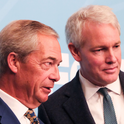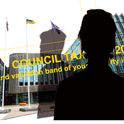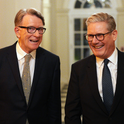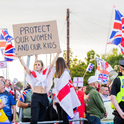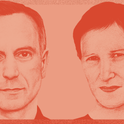The 24th of June 2016 was one of the most remarkable days in British political history. Pro-Europeans were left in a state of profound shock. What was to be Britain’s future role in the world?
It must have been particularly odd for David Hannay. Having joined the diplomatic service in 1959, Hannay is not your ordinary Remainer; he played a key role in negotiating Britain’s accession to the European Communities in 1973, two decades before the European Union as we know it came into existence. He worked his way up to ambassador to the EC from 1985-1990, and was later ambassador to the UN. Few people have been thinking about Britain’s international alliances for so long.
But having helped to secure British membership, Hannay is now watching it fall apart. I sat down with him on the day that parliament returned from recess. Now 82, Hannay sits in the Lords as a crossbencher. What was it like back then, when Britain was on the cusp of joining? And how did it feel watching Brexit unfold?
“I was a member of the negotiating team that finally got under way after the 1970 general election,” Hannay explained, leaning back in his chair. “The previous decade having been spent fruitlessly banging on the door of the EC.”
The European Communities was the collective term for the European Coal and Steel Community, Economic Community and Atomic Energy Community, and then comprised six countries. “I think if I had to put my finger on the date I realised I really minded about the EC, it would be General de Gaulle’s first veto” of British membership in 1963, Hannay said. “I was really shocked and angered that he could say we were simply not ‘European.’ That was a travesty.”
DeGaulle vetoed British membership on more than one occasion, but after he relinquished the French presidency in 1969 a window of opportunity opened: Britain could join the club. “There was a sense of great excitement. A major European country from outside was now joining, and in any case the new group would be able to drive forwards in a more purposeful way.”
“The date I really minded about the EC was General de Gaulle’s first veto”There followed in 1975 the referendum on continued British membership, which was won decisively. “Of course the consequences of our leaving would have been infinitely less complex than now, because instead of 40 plus years of integration and membership, we’d had about two years.” But the Yes campaign carried the day: “it turned out to be a massive two thirds/one third victory.”
From the start there were Eurosceptics unreconciled to British membership. Their arguments will be familiar: they thought the project was undemocratic and that we would have little say on the inside. Yet over the following years Britain led the way on various aspects of European policy. Margaret Thatcher is often heralded as the chief architect of the single market. Does this show that, at least back then, Britain led from within?
“Yes that is very strongly my view,” said Hannay. “I participated in the negotiation of the Single European Act, which formed the basis of the single market. And I believe very strongly that it has produced huge benefits to all members of the EU, and particularly to Britain, so it is a tragedy that we’re putting that all at risk for ‘single market minus’ now.”
But the single market was not the only issue “on which we gave a lead in Europe,” Hannay continued. “We certainly gave a lead on the eastward expansion of the EU when the Soviet Union collapsed. I think we were right to do it, I think it was very far sighted.” Britain again led on eastward expansion in 2004 when ten new members joined, though the immigration that followed was politically problematic.
There were other triumphs: “we had great success in liberalising European trade policy” with third countries, “which has gone through a number of important negotiations, both bilateral ones with countries like South Korea and Japan, and also multilateral ones.” Britain simply “had a lot of success” when it pushed for an outcome.
For Hannay this was the proper corrective after years outside spent looking in. “I’ve always thought about how we failed to shape Europe when it was first established,” he told me. The hope was to “make a place where Britain could be comfortable in its own approach to these European issues. My own view is that ironically, by 2016, when the PM decided—wrongly in my view—to put it all to the test of a referendum, we had actually got to a position where we were remarkably comfortable.”
“Politics is the art of the possible, and Brexiteers seem to have lost track of that”Britain had over the years also secured numerous opt-outs: Hannay was senior adviser to Thatcher on European budget negotiations, and therefore “strongly believes in the rebate and the justice of it.” He also helped to mastermind the exemption from monetary union before he left in 1990.
Yet successive leaders failed to communicate the British achievement. They “funked setting out the realities of the EU” and “paid a price for this” when the vote eventually came. The consequences of this failure will be grave. “I can see no circumstances, frankly, under which we will not be less prosperous, less influential and less secure” on the outside, Hannay said.
“I think we are astonishing the world in an extremely unwelcome way. Over the years there has been a tendency to think that we were pragmatic, reliable, solid citizens who tended to take our international obligations very seriously… and now? For the last two or three years people have watched in wonder at this country and the way their vision of it has been belied. We appear to have, as many of them would say, taken leave of our senses.”
Given the damage that will result from a hard Brexit, “I find it very odd that extremely intelligent, highly educated people like Jacob Rees-Mogg should be pursuing what they are pursuing. I often get the feeling that this has become something more like religion than politics. As a very famous Conservative figure Rab Butler said, politics is the art of the possible, and they seem to have lost track of that.”
“I believe myself that the 2016 referendum was won under false pretences,” Hannay continued. And that is why there must be a second—or for him, third—vote. “It would make sense to put the matter to the people.”
Away away from the churn in Westminster, the fundamental question has always been what sort of a country Britain wants to be. “I always had this feeling that we were European, and that we could not in any way hope to disassociate ourselves from what was going on on the continent,” Hannay said. The truth is “we needed to be part of it.”


